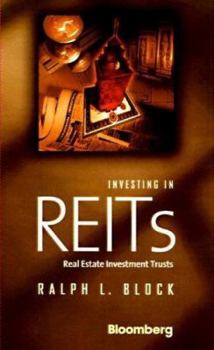Investing in REITs: Real Estate Investment Trusts: Third Edition
Select Format
Select Condition 
Book Overview
Customer Reviews
Rated 5 starsEssential for REIT investors
First, I have no connection with Ralph Block or any of the enterprises he was previously or is currently associated with. When the current edition of his book ("cobalt cover") was newly out, I took an online course from Block using the book as text. I was engaged in a total immersion crash course in investing (long overdue), being newly retired and confronted with managing for income a rollover IRA (having disengaged a 401K...
2Report
Rated 5 starsInvesting in REITS
Real Estate Investment Trusts, or REITs, that, in my opinion, are more of an asset class, like fixed income bonds, than a sector of the general stock market. Every investor should be familar with this asset class just as every investor should be familar with fixed the income class. One can choose not to invest in REITs, just as one can decide to be 100 per cent in equities, but the choice should be an informed one. "Investing...
2Report
Rated 5 starsNew, Improved Map of REITville
Since the original "Investing in REITs" was published in 1998, much has changed in REITville. REITs endured a minor bear market in 1998 and 1999, the Congress passed the REIT Modernization Act of 1999, and the investing public found REITs a profitable place to invest as the rest of market fell away from them in 2000 and 2001. This book is an interesting and enjoyable text as the reader is guided through the history of REITS,...
1Report
Rated 5 starsAuthor's Review of 3rd Edition
I am the author of "Investing in REITs," and would like to contribute a few comments regarding the new 3rd edition released in January 2006, and how it differs from prior editions. The new edition improves upon and updates the prior editions in two principal ways: First, it provides current information concerning the major events that have occurred and continue to evolve in the REIT industry. These include the REITs' bear...
2Report
Rated 5 starsPicked it up and couldn't put it down until the very end!
As an investment consultant, as well as an oft-harried, small apartment owner to boot, I personally witnessed, in the early 90s, the trials and tribulations of being directly involved in managing one's real estate investments - all this during a period in which, contrary to popular opinion, disciplined equity REITs still profited nicely. Despite my pre-existing biases, day by day, it was becoming ever more clear to me...
1Report












